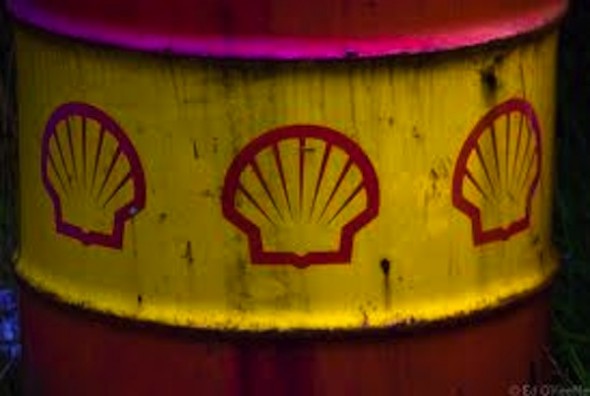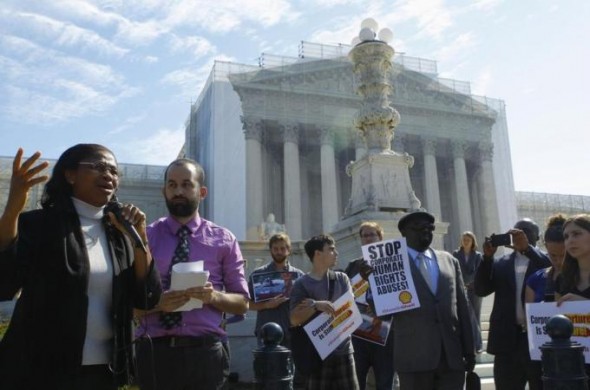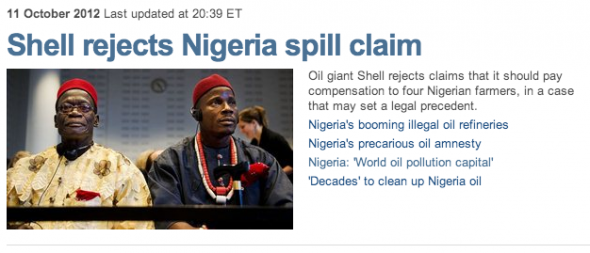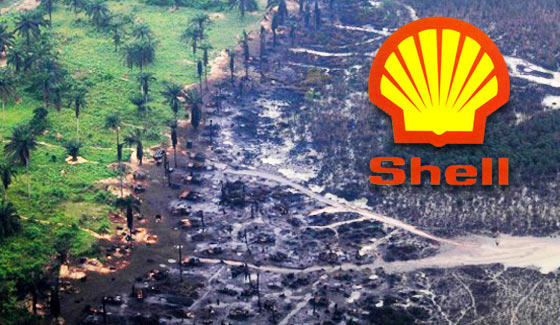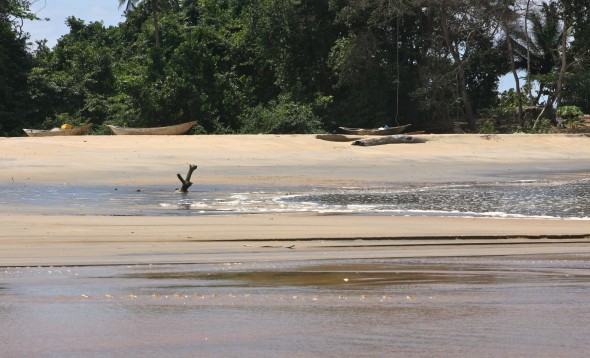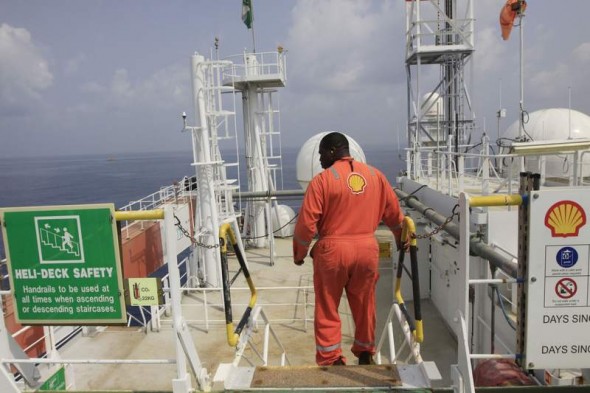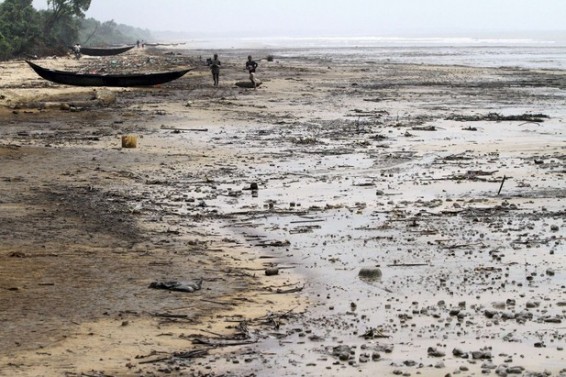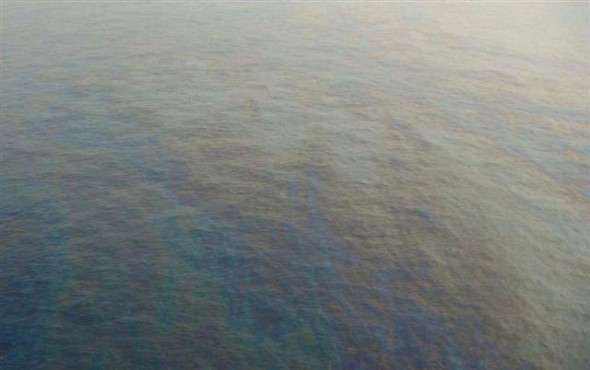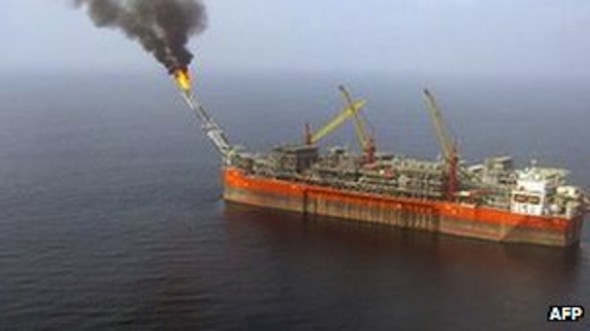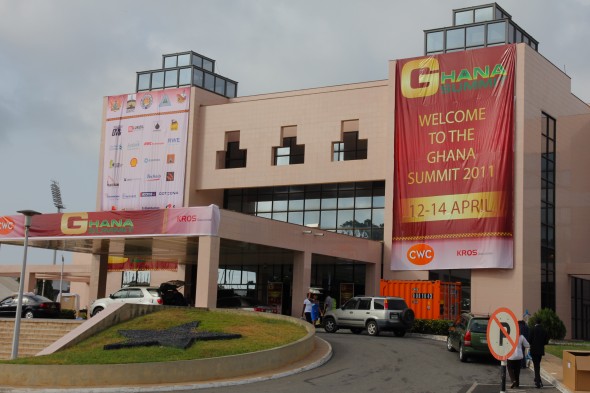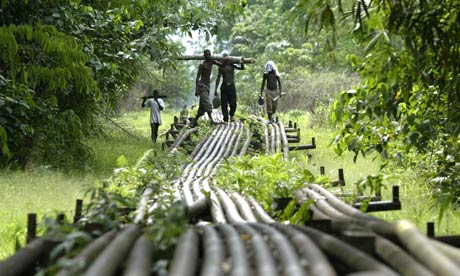Shell Shareholders at Risk from Billion Dollar Nigerian Oil Scandal, says Global Witness
Following is a press release from Global Witness:
Shell‘s role in a billion dollar corruption scandal in Nigeria poses significant hidden risks for investors, Global Witness said at the company’s 2015 AGM. The warning comes as the oil major is lobbying the UK and US authorities to undermine the implementation of new transparency laws which would consign such secretive deals to history.
The corruption at the heart of the deal deprived the Nigerian state of over U.S. $1.1 billion, triggered investigations by authorities in three countries, and could potentially lead to Shell and its Italian partner Eni losing access to the oil block.
Two steps forward, one step back
The Extractive Industries Transparency Initiative (EITI) adopted new standards intended to increase transparency in the oil, gas and mining industries. The new rules were announced in Sydney ahead of the EITI board meeting. Ironically, several of the major oil companies who sit on the EITI board are part of a U.S. lawsuit that seeks to weaken transparency legislation in the U.S. Inter Press Service describes the “disconnect”:
On the one hand, several of the world’s largest oil companies – including ExxonMobil, Shell and Chevron – sit on the EITI board and are thus inferred to be in agreement with the newly revised transparency rules.
On the other hand, these companies are currently part of a lawsuit here attempting to dismantle Section 1504 of the Dodd-Frank Act, the legislation on which the new EITI standards are mostly closely based.
Some good background reading while waiting for the Kiobel decision
“This may be the week that the Supreme Court finally issues a decision in the landmark Alien Tort Statute case, Kiobel v. Royal Dutch Petroleum,” international law expert John Bellinger wrote on March 24th. “Whether or not a decision is issued this week,” he adds, “most Kiobel watchers believe that the Court will rule in favor of Shell. But on what basis?”
He goes on to outline various legal theories that may persuade the judges (and leave human rights activists discouraged). Read the post here: Will the Supreme Court Issue a Decision in Kiobel This Week?
We’re still waiting for the decision and in the meantime I’m posting an opinion piece by Lauren Carasik, Director of the International Human Rights Clinic at Western New England University School of Law. This piece originally appeared on the Al Jazeera website. I’m posting the article in its entirety below as it gives a good overview of this case and the larger issue of transnational corporate liability for human rights abuses.
Indeed, as the Center for Justice and Accountability (CJA) writes in its overview of the Kiobel case, “The stakes are extremely high because the ATS is the only avenue for most human rights victims to hold perpetrators accountable. In the home countries of many victims, there is no legal forum available to seek justice. The Supreme Court is considering removing the U.S. as their last resort.
Shell Nigeria ruling: Glass half full or…
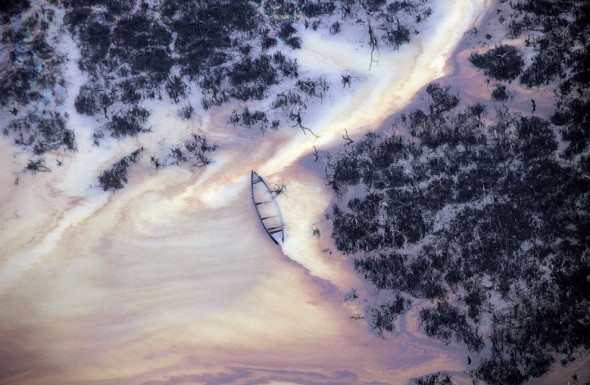
Oil flows past a sunken boat in a creek near an illegal oil refinery in Ogoniland, outside Port Harcourt, in Nigeria’s Delta region, on March 24, 2011. (Photo: Sunday Alamba © Amnesty International
Last week’s Dutch court ruling in the case brought by four Nigerian farmers against Shell for oil pollution damage is being reported as a “victory” for both the plaintiffs and for Shell.
So, who really won? It depends how you look at things. Live Wire, Amnesty International’s blog, has a an excellent summary of the case and the ongoing challenges facing those who want Shell to clean up its mess in the Niger Delta. The court ruled in favor of one plaintiff and that is significant. Shell will have to pay compensation to the farmer and, according to Amnesty International, “This week’s ruling means Shell can no longer point to sabotage as if the company has no responsibility for this problem, and it should have wider ramifications for Shell’s Nigeria operations.”
Shell on trial in The Netherlands
“For the first time in history, a European company, Anglo-Dutch oil giant Shall, has been brought to court in The Netherlands for damages it caused abroad. The plaintiffs are four Nigerians whose livelihoods and communities have been massively impacted by Shell’s operations.” From Friends of the Earth International. Read more and watch video here.
“If their case is successful it could pave the way for thousands of other compensation claims, says the BBC’s Anna Holligan in The Hague.” From the BBC. Read the full coverage of the day in court here.
ExxonMobil, Shell, abuse and accountability
Mother Jones magazine has published, Did ExxonMobil Pay Torturers?, by Ian T. Shearn and Laird Townsend. The article details ExxonMobil’s possible involvement in human rights abuses in Indonesia and the victims’ decade-long struggle for justice.
“In June 2001,” the authors write, “John Doe III and 10 other civilian neighbors of ExxonMobil’s Arun natural gas facility filed a lawsuit against ExxonMobil in federal district court in Washington, DC. In John Doe v. ExxonMobil, the villagers charge the company with complicity in torture, arbitrary detention, and extrajudicial killings allegedly committed by Indonesian soldiers it hired to provide security.”
Shell in the Niger Delta: the endless wait for clean-up
A team of assessors from the U.K. has just returned from a fact-finding mission to the Niger Delta and has slammed Shell for failing to clean-up pollution resulting from two 2008 spills. “Next to nothing has happened and where work has commenced it has been totally amateurish,” said said Martyn Day of the London-based law firm Leigh Day, speaking to John Vidal, environment editor at The Guardian.
You can read the article, Shell attacked over four-year delay in Niger Delta oil spill clean-up, for more details on Shell’s failure to get serious about cleaning up the extensive damage from the spills.
This is merely the latest in a series of damning critiques of Shell’s failure to clean up its pollution. Shell initially denied responsibility for the spills and when the company did accept responsibility it “dramatically underestimated the quantities” of oil spilled.
Oil pollution, sabotage and security
I’m finally back at my desk, catching up with news and writing.
Oil watchdog Platform has published a briefing, Dirty Work, revealing Shell’s financial links to human rights abusers in Nigeria.The company spends hundreds of millions of dollars on security forces to protect its workers while the suffering of local communities continues unabated.
This briefing arrives a year after the publication of a U.N. report that slammed multinational oil companies, Shell in particular, for a half century of pollution in the Niger Delta. A recent Reuters article, A year on, Nigeria’s oil still poisons Ogoniland, describes the situation today:
The transparent hypocrisy of big oil
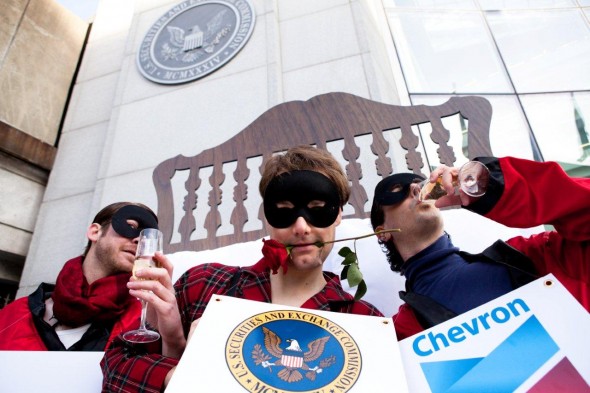
S.E.C. in bed with the oil companies? Oxfam event in front of S.E.C., February 10, 2012. Photo: Oxfam America
Ian Gary at Oxfam America has posted another excellent piece on the shameless hypocrisy of oil companies now pressuring the S.E.C. to water down parts of the 2010 Dodd-Frank financial reform legislation. (Read my blog post from yesterday for more background on this story.) Here’s the article cross-posted from Politics of Poverty:
The yawning gap between the transparency rhetoric of companies and the reality of their actions has never been more apparent than it is now.
The oil and gas industry loves to trumpet their support of international transparency initiatives and their tax contributions to the US government, but when a new law requires them to tell the public exactly how much gets paid to whom around the world, they bring out the lobbyists and lawyers.
Browse through the corporate social responsibility reports of the top oil and gas companies, and you’ll see them singing from the same transparency hymnbook. Chevron says it “believes that the disclosure of revenues received by governments and payments made by extractive industries to governments could lead to improved governance in resource-rich countries.”
Bonga spill investigation ordered
The Nigerian government has mandated an investigation into the cause and effect of the Bonga oil spill on December 20th.
An NGO has also raised questions regarding Shell’s use of dispersants without any monitoring or assessment plan.
Fishermen are blaming the spill for a dwindling fish supply and rising prices.
Meanwhile, Shell is moving ahead with its plans to drill in the Arctic waters off Alaska.
“The polluter is strangely in charge of the regulators.”
That’s a perfect line to sum up the oil industry in Nigeria.
Day two of the general strike and ongoing sectarian violence have pushed news of the Bonga field oil spill to the back pages, but in the end it’s all about oil. Whether it’s pollution on the beach, corruption or violence, the source of Nigeria’s malaise is oil.
But back to that line, “The polluter is strangely in charge of the regulators.” That’s from an editorial that appeared on January 9th in the Nigerian Compass.
Bonga field: Back to business as usual
LAGOS, Nigeria — Royal Dutch Shell PLC’s Nigerian subsidiary says it has resumed production at a 200,000 barrel-per-day oil field after containing the worst Nigeria offshore spill in more than a decade.
Spokesman Tony Okonedo said in a statement Thursday that steps had first been taken to ensure it was safe to restart production at the Bonga deep-water oil field.
That’s the word from the Associated Press. Reuters adds a bit more information:
Nigerian villagers say oil from the spill at Bonga, 120 km offshore, had washed up on the coast, blackening stretches of it and killing fish, but Shell has denied that the oil could be from the Bonga facility.
More Nigeria news from SkyTruth
Why do we hear so little about spills in the Gulf of Guinea region? Well, there are the officials and companies who don’t (seem to) give a damn. There are the restrictions on the press in a number of countries and the lack of resources for journalists across the region that hamper in-depth reporting. But there’s also the fundamental lack of oversight: we don’t hear much because the governments themselves don’t know much. They don’t have monitoring systems and are — far too often — at the mercy of the oil companies when it comes to getting information about spills and clean-up.
SkyTruth, an organization that seeks to create environmental awareness through the use of satellite imagery (“If you can see it, you can change it”), has been posting regular updates on the recent Bonga spill.
I’m reposting links to the last two pieces from SkyTruth, which get at several crucial points regarding the Gulf of Guinea: No one knows what’s going on because of the lack of monitoring and oil is being spilled or dumped all the time in the region. Remember the spill off the coast of Ghana in November? Was it from the Jubilee operations or a passing tanker? Who knows?
Continue reading . . .
Did someone say oil spill?
As the spill offshore Nigeria works its way to shore, the lack of information about what is actually happening is depressingly familiar.
Shell reports that less than 40,000 barrels were spilled (at 42 gallons per barrel, that’s something like 1.6 million gallons), but there’s no way to verify that information. Shell posted a photo of the source of the spill, a rupture in the line that carries oil from the offshore storage facility (the FPSO) to oil tankers.
Oil spill offshore Nigeria
News from Nigeria:
Nigeria in Race to Limit Shell Oil Spill
Lagos – Authorities rushed to prevent one of Nigeria’s worst recent oil spills from reaching the West African nation’s shoreline on Thursday, with production from a major Shell field also shut due to the leak.
Shell, which said the leak has been stopped, has estimated that less than 40 000 barrels of crude have spilled into the sea and was deploying ships with dispersants to attack the slick. Planes were also being mobilised.
It was Nigeria’s worst offshore spill since a 1998 Mobil incident, officials said, though onshore leaks have been estimated at levels far worse since that time in the oil-producing Niger Delta.
Shell in the Niger Delta: It gets uglier with each revelation
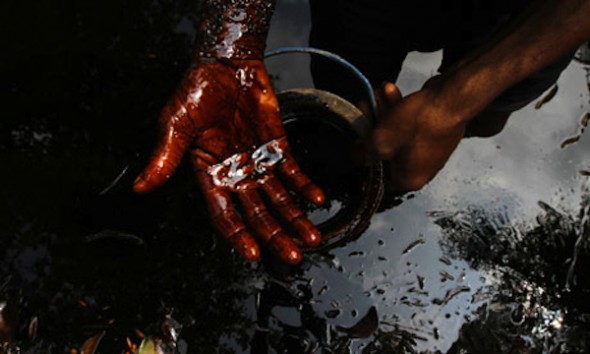
Shell oil activities in Ogoniland in the Niger delta have polluted rivers. Photograph: Akintunde Akinleye/REUTERS
Several damning articles have been been published in The Guardian (U.K.) over the past few days.
Sunday’s headline, Shell oil paid Nigerian military to put down protests, court documents show, gets right to the point.
John Vidal, Environment Editor, writes: “Shell has never denied that its oil operations have polluted large areas of the Niger Delta – land and air. But it had resisted charges of complicity in human rights abuses.
“Court documents now reveal that in the 1990s Shell routinely worked with Nigeria‘s military and mobile police to suppress resistance to its oil activities, often from activists in Ogoniland, in the delta region.
A Slideshow from Hell

Oil flows past a sunken boat in a creek near an illegal oil refinery in Ogoniland, outside Port Harcourt, in Nigeria's Delta region, on March 24, 2011. (AP Photo/Sunday Alamba)
Here’s the introduction to a devastating series of photos reprinted in the Atlantic ( from the In Focus blog):
The Ghana Summit 2011
The oil and gas industry trade show rolled into town this week. For three days conference delegates sat through strategy sessions, chatted with exhibitors and attended networking coffee sessions, lunches, gala cocktail parties and dinners. The halls of the Accra conference center were filled with exhibitors stands: from Tullow Oil, lead partner in Ghana’s Jubilee Field, to distributors of work boots and catering services, everyone wanting in on Ghana’s oil business was here.
WikiLeaks cables: Shell’s grip on Nigerian state revealed
I am posting an article from The Guardian. This news is a stark reminder that the “resource curse,” is not just a problem of bad governance and corrupt politicians.
The oil giant Shell claimed it had inserted staff into all the main ministries of the Nigerian government, giving it access to politicians’ every move in the oil-rich Niger Delta, according to a leaked US diplomatic cable.
The company’s top executive in Nigeria told US diplomats that Shell had seconded employees to every relevant department and so knew “everything that was being done in those ministries”. She boasted that the Nigerian government had “forgotten” about the extent of Shell’s infiltration and was unaware of how much the company knew about its deliberations.
The cache of secret dispatches from Washington’s embassies in Africa also revealed that the Anglo-Dutch oil firm swapped intelligence with the US, in one case providing US diplomats with the names of Nigerian politicians it suspected of supporting militant activity, and requesting information from the US on whether the militants had acquired anti-aircraft missiles….
Campaigners tonight said the revelation about Shell in Nigeria demonstrated the tangled links between the oil firm and politicians in the country where, despite billions of dollars in oil revenue, 70% of people live below the poverty line.
The Yes Men Inspire Nigerian Activists
The Yes Lab has helped Nigerian activists pull off a successful hoax. Here’s the story:
Shell Flummoxed by Fakers
Company flummoxes back; activist group takes responsibility
The Hague – Hours before Shell’s annual general shareholder meeting on Tuesday, and not long after BP’s oil rig catastrophe, millions of people around the world received press releases announcing that Shell would implement a “comprehensive remediation plan” for the oil-soaked Niger Delta. The plan included an immediate halt to dangerous offshore drilling, the end of health-damaging gas flaring, and reparations for the human damage caused over the decades of Shell’s involvement.
The “good news” was fiction, created by an ad-hoc activist group called the Nigerian Justice League to generate pressure on Shell to withdraw from, and remediate, the Niger Delta. According to the activists, Shell’s operations in the Delta have helped transform that area into the world’s most polluted ecosystem, which has in turn resulted in a human rights catastrophe.
(The NJL developed the project as part of the Yes Lab, a workshop run by a group called “The Yes Men” to share their experiences and facilitate the projects of others. The Yes Lab is in the midst of a fundraising drive.)
“Shell, Chevron, and the others are perpetrating a massive, life-threatening hoax by claiming that they can’t quickly stop their gas flaring, reduce their oil spills, and clean up their mess in the Niger Delta,” said Chris Francis of the Nigerian Justice League. “Our press release revealed the truth: that there is a decent way forward, instead of the continual deceit we get from them.”
Shell’s public relations staff quickly and energetically moved to contain the fallout from the fake release. On Tuesday, Shell attempted to eliminate the Justice League’s spoof Shell website by complaining that it was a “phishing scheme” to the upstream internet service provider. Shell then sent a threatening legal letter to the Danish internet provider hosting the site.
In a related story, the Financial Times (a blog of which, incidentally, was duped by the fake release) refused to run a hard-hitting advertisement, created and paid for by Amnesty International, that called for action against Shell for its Niger Delta legacy. Like the fake release, the ad was timed to coincide with Shell’s May 18 AGM.
“For now, Shell’s legal threats are bearing ripe fruit,” said Esmée de la Parra of the Nigerian Justice League. “But they can’t keep blustering their way to destruction forever. Eventually, people will have had enough. For the sake of the planet, let’s hope ‘eventually’ is very soon.”

